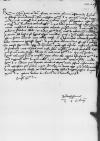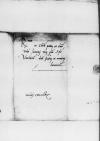List #2011
Tiedemann GIESE do Ioannes DANTISCUSLöbau (Lubawa), 1538-12-06
| odebrano [1538]-12-08 Rękopiśmienne podstawy źródłowe:
| ||||
Tekst + aparat krytyczny + komentarzZwykły tekstTekst + komentarzTekst + aparat krytyczny
Reverendissimo in Christo Patri et Domino, domino
Reverendissime in Christo Pater et Domine, frater et maior plurimum mihi observande.
Salutem et studiosam commendationem.
Diu misissem Reverendissimae Dominatoni Vestrae exemplum inclusum regii mandati, quod a magnifico domino
De accisa seponenda usque ad conventum quod ipse contulit, nescio, an probanda sit sententia. Certe non satis tutum mihi videtur consilium nec facile excusabile. Ego quid sentiam, antea scripsi, libenter tamen auditurus Reverendissimam Dominationem Vestram, quae etiam scribere dignetur voluntatem suam et consilium super altero illo negotio defensionis Reverendissimae Dominationis Vestrae apud
Cupio Reverendissimam Dominationem Vestram optime valere.
Eiusdem Reverendissimae Dominationis Vestrae studiosissimus


 BCK, 1597, p. 346
BCK, 1597, p. 346